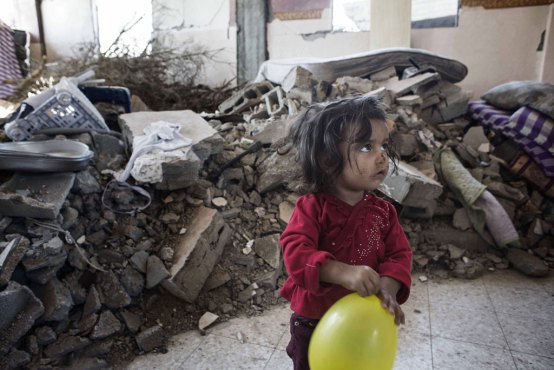United Nations officials gathered at the UN Crime Congress under way in Doha, Qatar, on 18 April 2015 called on Member States to take action and implement the new international standards on the elimination of violence against children adopted late last year, stressing that such violence continues to have a devastating effect on children, families, and society as a whole.*
The new set of international standards and norms – entitled the “United Nations Model strategies and practical measures on the elimination of violence against children in the field of crime prevention and criminal justice,” and approved by the UN General Assembly on 18 December 2014 – aim to not only improve the effectiveness of the criminal justice system in preventing and responding to violence against children but also to protect children against any violence that may result from their contact with that system.
Speaking at a high-level event on the margins of the Crime Congress, Valerie Lebaux, the Chief of the Justice Section, Division for Operations, in the United Nations Office on Drugs and Crime (UNODC), said such Model strategies represent “an historical achievement and a strong endorsement of the commitment of Member States towards addressing the issue of violence against children.
As part of its mandate, in fact, UNODC has now developed a joint global programme with the United Nations Children’s Fund (UNICEF) to tackle head-on the scourge of violence against children.
“Considering the complex nature of the issue, the needs for technical assistance are extensive and cannot be met within a short period of time,” Ms. Lebaux continued. “Our joint efforts are essential to translate the Model Strategies into concrete actions.”
In addition, she stressed that interventions require the effective incorporation of international standards and norms into national legislation, the establishment of accountable institutions and policies, the training of justice practitioners, and the cooperation between child protection and justice systems.
Also addressing the high-level event, Mona Rishmawi, Chief of the Rule of Law, Equality and Non-Discrimination Branch at the Office of the High-Commissioner on Human Rights (OHCHR), drew attention to the numerous children lost in the world’s prison systems, adding that a justice policy that places “emphasis on incarceration and criminal sanction, in particular as a primary response to child offenders is simply the wrong response.”
“Children do not belong to prisons. Children should not be kept in closed institutions deprived of care, love and nurture. They belong in schools, in playgrounds and safe home environments,” Rishmawi declared.
“We know that wherever children are deprived of liberty they are at especially high-risk of physical violence and abuse whether by the police, other detainees or their own peers,” she continued, adding that children deprived of their liberty had a higher rate of anxiety, depression and feelings of helplessness.
“That’s why we welcome these Model Strategies and that’s why they are needed,” she concluded. (*Source: UN).
Read also:
2014 – ‘Never in Recent Memory Have So Many Children Been Subjected to Such Unspeakable Brutality’
14 Million Children Impacted by Conflict in Syria and Iraq – UNICEF
South Sudan: Future of an Entire Generation of Children, Stolen in One Year
Protecting Children Exploited for Sex, in Thailand – and Asia-Pacific
In South Sudan, a Single Mother’s Fight For Survival
2014 – ‘Never in Recent Memory Have So Many Children Been Subjected to Such Unspeakable Brutality’
A Desperate Struggle Against Starvation in South Sudan
South Sudan: Water Shortages Hit Crisis Point in Refugee Camps
Dramatic Situation of Over 100,000 Refugees in South Sudan
‘Alarming’ Health Situation in South Sudan Camps
Manhunt: This is Racism, Pure and Simple
S. Sudan Returnees Complain of ‘Harsh Treatment’ in Israel – UN
South Sudan: Yet Another Kitchen-Garden?
South Sudan the Year After – Violence and Misery Everywhere
South Sudan: “People are Dying, People are Suffering—This Is a Crisis”
No Food for Half of Oil-Rich South Sudan Population
Does Anyone Know Anything About A New Country Called South Sudan?
Children Born in Exile — The Challenge of Life in Their Afghan Homeland
Is the World a Better Place for Children?
“Children are the fundamental building block for achieving the future we want”
Complications of Premature Birth, World’s Number One Killer of Young Children
Can Innovation Drive Change for Most Disadvantaged Children?
Children Born in Exile — The Challenge of Life in Their Afghan Homeland
How Does a Ball Help Change the Lives of Children?
Mobile Training Van Makes a Difference to Street Children in Thailand
Migrant Detention “Abuse” Can Scar Children for Life
Indiscriminate, Brutal Killings Children in Conflict
No ‘Back to School’ for 30 Millions of Children Affected by Conflict, Crisis – UN
Violence against Children Is Universal, Deeply Ingrained in Societies, Often Accepted as the Norm
Hidden in Plain Sight — New Global Data Expose “Acute Prevalence” of Violence against Children








